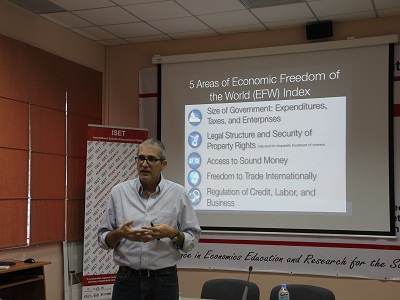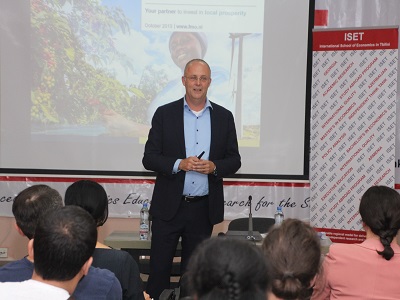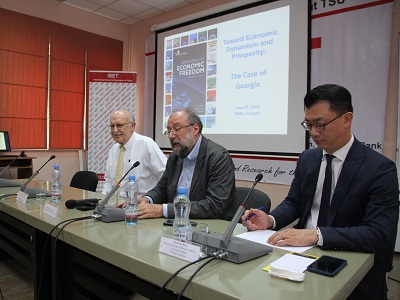On October 25th, ISET was visited by Dr. Robert A. Lawson of the Fraser Institute. In a highly entertaining and often humorous lecture, Dr. Lawson discussed a wide variety of topics, including the notion of economic freedom, research into economic liberty, as well as Georgian reforms since 2004 and recommendations for future development.
One of the most important aspects of Dr. Lawson’s presentation was the fact that Georgia, as a small country, is highly dependent on international trade for future growth. This is in contrast to the United States: as Dr. Lawson explained in a hypothetical scenario, if the US was to hypothetically abruptly cease all trade with other countries, it would still retain something of an economy, albeit one far reduced in size. This is simply due to the fact that the US has such a large population; small countries such as Georgia, meanwhile, would collapse without foreign trade partners. With this in mind, Dr. Lawson then discussed Georgia’s case specifically and attributed the country’s economic success over the last two decades to successfully deepening ties with other countries.
On October 2nd, ISET was visited by representatives of FMO, the Dutch Entrepreneurial Bank, who came to talk about the Bank’s activities and its investments in Georgia. Mr. Jan-Willem Hoek, Investment Officer, and Ms. Naomi Campbell, Environmental & Social Officer, gave a presentation entitled ‘Doing Makes The Difference’, and explained the Bank’s commitment to global development and humanitarian outcomes.
In Georgia, FMO has partnered with TBC Bank to finance young entrepreneurs running micro, small and medium-sized enterprises, as well as retail customers requiring a mortgage. FMO’s own financing is split between the Netherlands’ major banks and the Dutch Government; along with its partners in TBC, the Bank cooperates closely with the Dutch Embassy in Georgia, and so Her Excellency Loes Lammerts, the Deputy Head of the Embassy of the Netherlands, also attended.
That Georgia is making strident progress on a variety of international indices is widely reported in the domestic press, but many Georgians may still view claims of their country ranking highly on global lists of safety and economic freedom with a degree of skepticism; after all, the average wage remains low, and there are few opportunities outside of the capital.
It is, therefore, enlightening to hear exactly how Georgia is making progress first-hand from experts. On Friday June 28, representatives of the Heritage Foundation visited ISET to present the findings of the organization’s 2019 Index of Economic Freedom. The Heritage Foundation is an influential Washington-based think tank that came to prominence during the Reagan Administration of the 1980s, and remains one of the most influential research institutions in the United States. Along with its economic interests, the Foundation also reviews government policies and budgetary activities.













